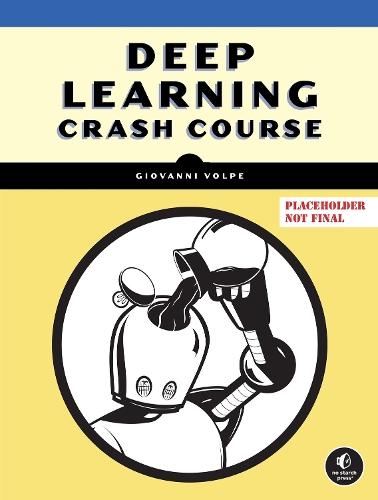Overview
A complete guide to deep neural networks - the technology behind AI - covering fundamental and advanced techniques to apply machine learning in real-world scenarios. A complete guide to deep neural networks - the technology behind AI - covering fundamental and advanced techniques to apply machine learning in real-world scenarios. Deep Learning Crash Course goes beyond the basics of machine learning to delve into modern techniques and applications of great interest right now, and whose popularity will only grow in the future. The book covers topics such as generative models (the technology behind deep fakes), self-supervised learning, attention mechanisms (the tech behind ChatGPT), graph neural networks (the tech behind AlphaFold), and deep reinforcement learning (the tech behind AlphaGo). This book bridges the gap between theory and practice, helping readers gain the confidence to apply deep learning in their work.
Author Information
Giovanni Volpe is a professor in the Physics Department of the University of Gothenburg, Sweden, and head of the Soft Matter Lab. His research interests include deep learning, brain connectivity, statistical mechanics, and soft matter. He has authored more than 200 articles and reviews on these topics and has co-authored two books. He has also developed several software packages for microscopy, deep learning, and brain connectivity. Joana B. Pereira is an associate professor at Karolinska Institute in Sweden, where she focuses on investigating new biomarkers for neurodegenerative disorders, in particular Alzheimer's disease. Since 2020, she has organized an annual interdisciplinary conference called Emerging Topics in Artificial Intelligence in San Diego, CA. She is the scientific coordinator for NeurotechEU and winner of the 2021 de Leon Prize for best neuroimaging article in Alzheimer's disease. Carlo Manzo is an associate professor at the University of Vic, Spain, where he leads the Quantitative Bioimaging Lab. His research is dedicated to the analysis of biophysical processes, merging deep learning techniques with state-of-the-art imaging technologies to achieve single-molecule sensitivity. He is the founder of the Anomalous Diffusion challenge and winner of the 2017 E. Perez Paya Prize from the Sociedad de Biofisica de Espana. Benjamin Midtvedt is a doctoral researcher working to enhance the field of microscopy through deep learning. The unifying focus of his research has been the development of accessible and practical AI optimized to the needs of the user. He has also been the lead developer of several Python-based open-source deep learning frameworks. Jesos Pineda is a doctoral researcher in physics focused on the intersection between deep learning and computer vision. He has co-authored several articles in high-impact journals on the application of deep learning to glean insights from microscopy data. Jesos is also a core developer of the deep learning software packages DeepTrack and Deeplay. Henrik Klein Moberg is a Ph.D. candidate at Chalmers University of Technology specializing in the integration of AI with physical sciences. His research focuses on applying deep learning techniques to nanofluidic microscopy and nanophotonics, aiming to enhance the precision and efficiency of these technologies. He has also organized and spoken at numerous conferences related to AI and scientific data analysis. Harshith Bachimanchi is a PhD student whose research combines holographic microscopy and deep learning to better understand marine microorganisms. Harshith has used deep learning techniques and experimental optics to track both biological and synthetic particles, enhancing our understanding of these complex systems. He has also developed simulations demonstrating the applications of deep learning in microscopy.




